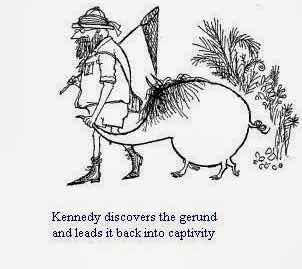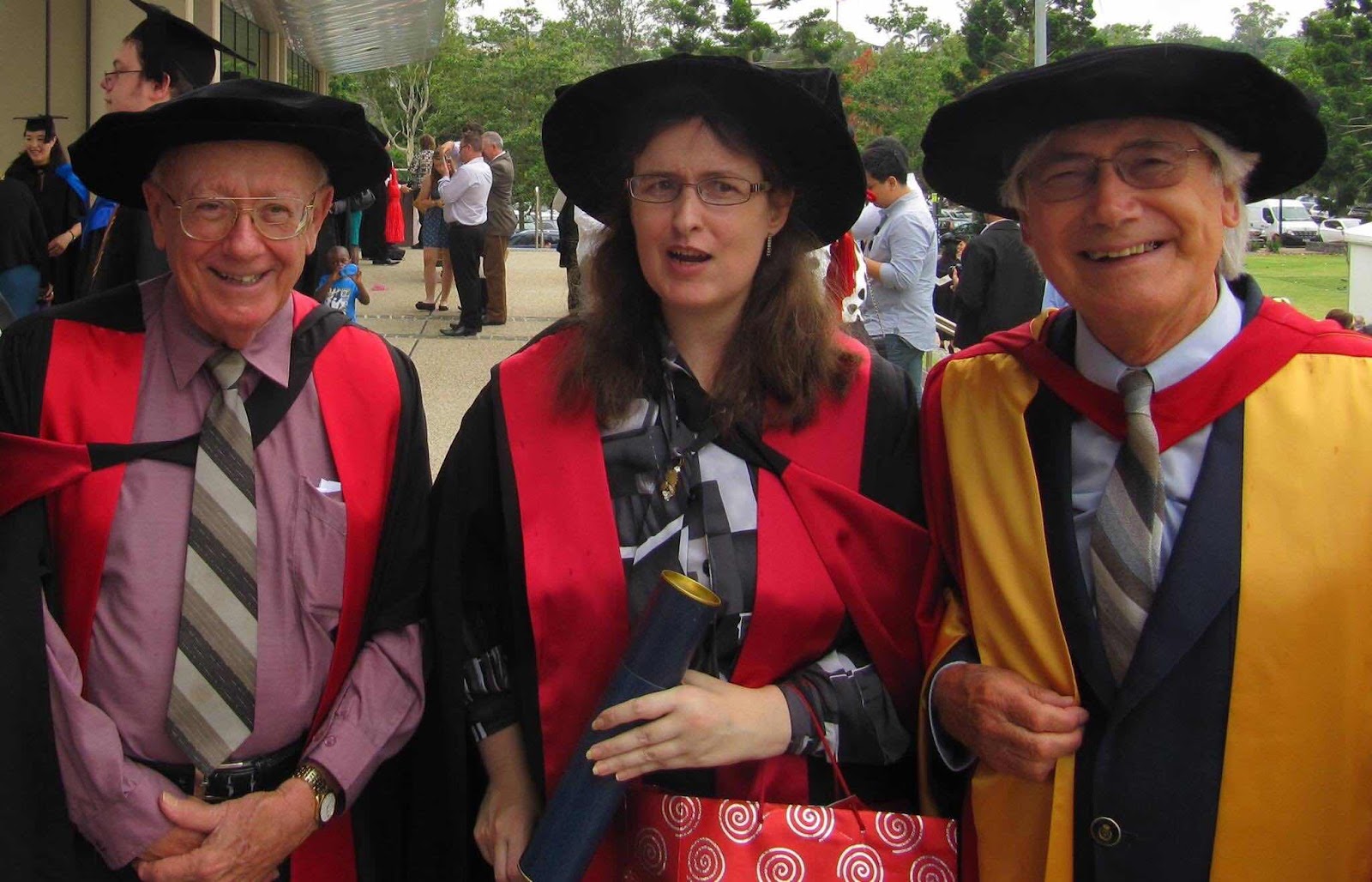Remembering Bob Milns
This morning a legend of The University of Queensland classics and ancient history department/discipline passed away.
 He once apologised for arriving in a suit as he had just come from the Greek Consulate and hadn’t had time to remove his jacket before dashing to class, exhibiting at once how he felt about his obligation to the Greek community in Brisbane and his thoughts about comfortable dress when teaching. I remember him celebrating for the first time in a decade or more having left enough time at the end of his Philip of Macedon and Alexander the Great course to devote to the Successors of Alexander. Part of the reason why this was a shock was because of what some student had dubbed “the Milnsian tangent.” Bob loved everything about the Graeco-Roman world, including its broadest reception, and thus he was easily diverted from his lecture notes to make a comparison between what he had just discussed and something else entirely.
He once apologised for arriving in a suit as he had just come from the Greek Consulate and hadn’t had time to remove his jacket before dashing to class, exhibiting at once how he felt about his obligation to the Greek community in Brisbane and his thoughts about comfortable dress when teaching. I remember him celebrating for the first time in a decade or more having left enough time at the end of his Philip of Macedon and Alexander the Great course to devote to the Successors of Alexander. Part of the reason why this was a shock was because of what some student had dubbed “the Milnsian tangent.” Bob loved everything about the Graeco-Roman world, including its broadest reception, and thus he was easily diverted from his lecture notes to make a comparison between what he had just discussed and something else entirely.
And while I can write about what Bob taught in classes, that is somewhat secondary to what he taught me as a person and as an honours and post-graduate student whom he supervised, and a friend. By his willingness (along with Brian Jones) to supervise my honours thesis on poisons and antiquity, he taught me that academics can support their students’ curiosity and trust their research abilities. It would have been easy for them both to shut down my interest as “not adhering to their areas of expertise”, but instead they trusted me to research the topic and present the outcomes of my research. Without that trust, my book on Roman medicine would never have been written. Bob, for his part, was just upset to learn that strychnos did not relate to strychnine and therefore he should fix that theory should he write another edition of his book on Alexander the Great. Both Bob and Brian similarly supported me when I chose the topic of pantomime dance for my PhD thesis topic. Without them once again placing aside their ideas of what they knew intimately and trusting me, I wouldn’t have been invited to conferences at Oxford and Brest.

Left to right: Dr B. W. Jones, me, Emeritus Professor R. D. Milns at my graduation in 2013.
Emeritus Professor R. D. Milns, or as he invited all to call him, Bob, was the third (or fourth, I can’t remember if there was someone else between him and Professors Michie and Cooper) of Classics at UQ. I could look it up, but this post isn’t really about recording his entire life, but is instead a reflection on what Bob meant to me.
Bob had been well entrenched at UQ before I started my degree in 1997. When talking about his life as a student in England, for example, he told me that he attended Cambridge because, unlike Oxford, it didn’t expect him to change his Yorkshire accent. As a proud Yorkshire man he wasn’t about to change the way he spoke, especially because he thought it was unfair that this was expected of domestic students but not international students. I don’t know that I’d given much thought to Oxford and Cambridge Universities before that point, but I too thought the double-standard was unfair. From what I can remember, he came out to Australia having finished his Masters Degree in Classics to take a position at the University of New England, and then came up to Brisbane.
I don’t think I had a class with Bob in my first year, but I was his student in numerous courses after that first year. In third semester Latin I recall him trying to remember a cartoon about the gerund which he poorly tried to recreate on a chalkboard; I am fairly certain that the comic he was trying the draw is the one featured here. He failed miserably.
And while I can write about what Bob taught in classes, that is somewhat secondary to what he taught me as a person and as an honours and post-graduate student whom he supervised, and a friend. By his willingness (along with Brian Jones) to supervise my honours thesis on poisons and antiquity, he taught me that academics can support their students’ curiosity and trust their research abilities. It would have been easy for them both to shut down my interest as “not adhering to their areas of expertise”, but instead they trusted me to research the topic and present the outcomes of my research. Without that trust, my book on Roman medicine would never have been written. Bob, for his part, was just upset to learn that strychnos did not relate to strychnine and therefore he should fix that theory should he write another edition of his book on Alexander the Great. Both Bob and Brian similarly supported me when I chose the topic of pantomime dance for my PhD thesis topic. Without them once again placing aside their ideas of what they knew intimately and trusting me, I wouldn’t have been invited to conferences at Oxford and Brest.
So what has this trust taught me when dealing with students? Just because I don’t know exactly what a student is discussing and researching, that doesn’t mean that I cannot support them and offer advice about how to approach any topic. Research should expand our knowledge of the past, not conform to those areas with which we are already comfortable. While he had retired well before I finished my PhD, Bob continued to have my back. I once made the statement that I wasn’t a scholar of Greek and he jumped on me immediately. “Yvette, you have given and written papers about Greek sources and Byzantine history. You are by definition a Greek scholar!” Bob had no time for imposter syndrome and frequently referred to me as Dr Hunt as if determined single-handedly to get me past wincing at my newly conferred title.
Bob always had time for me and all his students. While he would always correct us, he would do so in a manner which didn’t leave you feeling a lesser person or scholar. I remember once that someone, it may have been me but I’m not positive, had used a split infinitive. Rather than going on with a pedant’s rant regarding this, he mentioned the outcry when Star Trek was first on TV as it used the phrase “to boldly go where man had never gone before.” A rant on the finer points of English grammar would not have stuck in my mind as well as his effected shudder about how that had been received at the time. He also warned students about those academics who were not as kindly as he; telling stories about fearing the raised hand of one Ernst Badian at conferences and describing “the watery bowels which accompanied the fear of being Badianised.” Such stories helped to prepare the unwitting postgrad as they started to attend conferences.
Bob’s passion for the classical world cannot be understated. He took the time to teach not just his students, but the wider community. While his ongoing commitment the the alumni/community groups Friends of Antiquity and the Queensland Friends of the Australian Archaeology Institute at Athens is well known and will be missed, he reached a broader audience by speaking on radio. This engagement had unintended consequences. My father was a truck driver, but he often astounded and amazed me with tidbits of classical knowledge in conversations. It was only after he died that my mother informed me that he made a point of always listening when Bob was on the radio so he could shock my socks off with unexpected references to things like Romulus and Remus. I can only imagine with how great an audience Bob managed to share his passion for the classical world.
There are probably more stories I could tell about Bob, but I just want to high-light how he has helped me be a better educator and person. Always try make time for students. If they’ve reached out for help, they need it. But also when advising students, show them how to do something so they can better do it themselves. Never denigrate students: today’s interested student is tomorrow’s colleague. Always go out of your way to learn something new: while new information is its own delight, you might also be able to use it to help someone else later. Be unashamed in your passions: you never know how your passion might affect others, but being grossly excited about it will definitely make your influence greater. Be honest and humble: admitting you didn’t know something often bolsters another’s sense of worth.
I will dearly miss Bob.
The University of Queensland will miss Bob.
The broader community will miss Bob.
He lived large and influenced all around him, and he certainly influenced me.
Dis Manibus Bob Milns.
Left to right: Dr B. W. Jones, me, Emeritus Professor R. D. Milns at my graduation in 2013.
Post script: I’ve been saying that I need to get back to writing for a while now, but I haven’t. Bob wouldn’t chastise me, but he’d gently let me know that he was disappointed that it took his death to make me do so.

I remember a lecture of Bob’s, quite probably the Alexander course, where we had somehow quite marvellously got off topic to discuss cooking lobster. Bless him ��
ReplyDeleteI remember a lecture of Bob’s, quite probably the Alexander course, where we had somehow quite marvellously got off topic to discuss cooking lobster. Bless him ��
ReplyDeleteI remember a lecture of Bob’s, most likely in the Alexander course, where we had somehow, delightfully, gotten off topic to discuss eating lobster. Bless him 😂
ReplyDeleteThank you Yvette- this is a beautiful piece and you have it brought a tear to my eye.
ReplyDeleteHe will indeed be missed, and I am glad to have been lucky enough to have known such a lovely and amazing human being. Lynn and his family have my deepest condolences.
Thank you.
ReplyDeleteBeautiful words remembering a wonderful man.
ReplyDelete